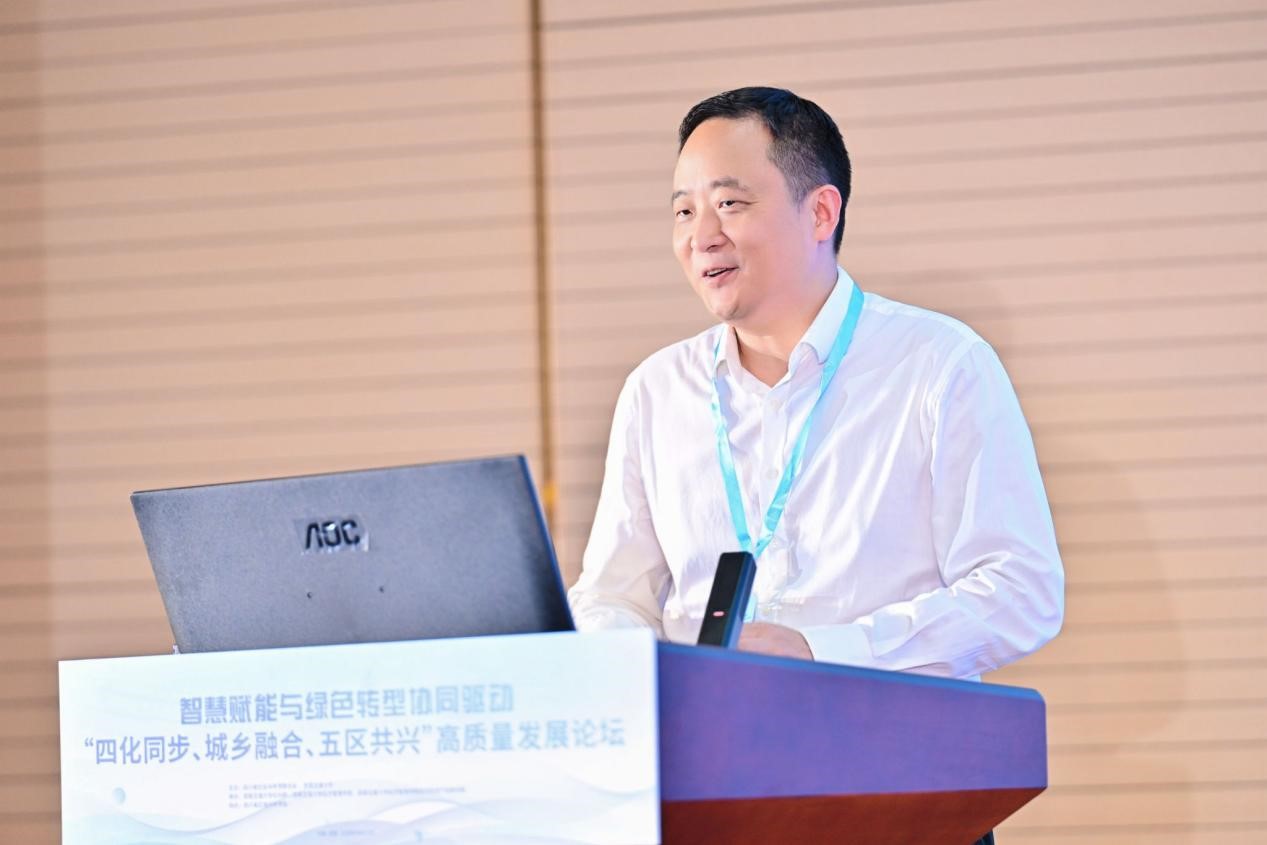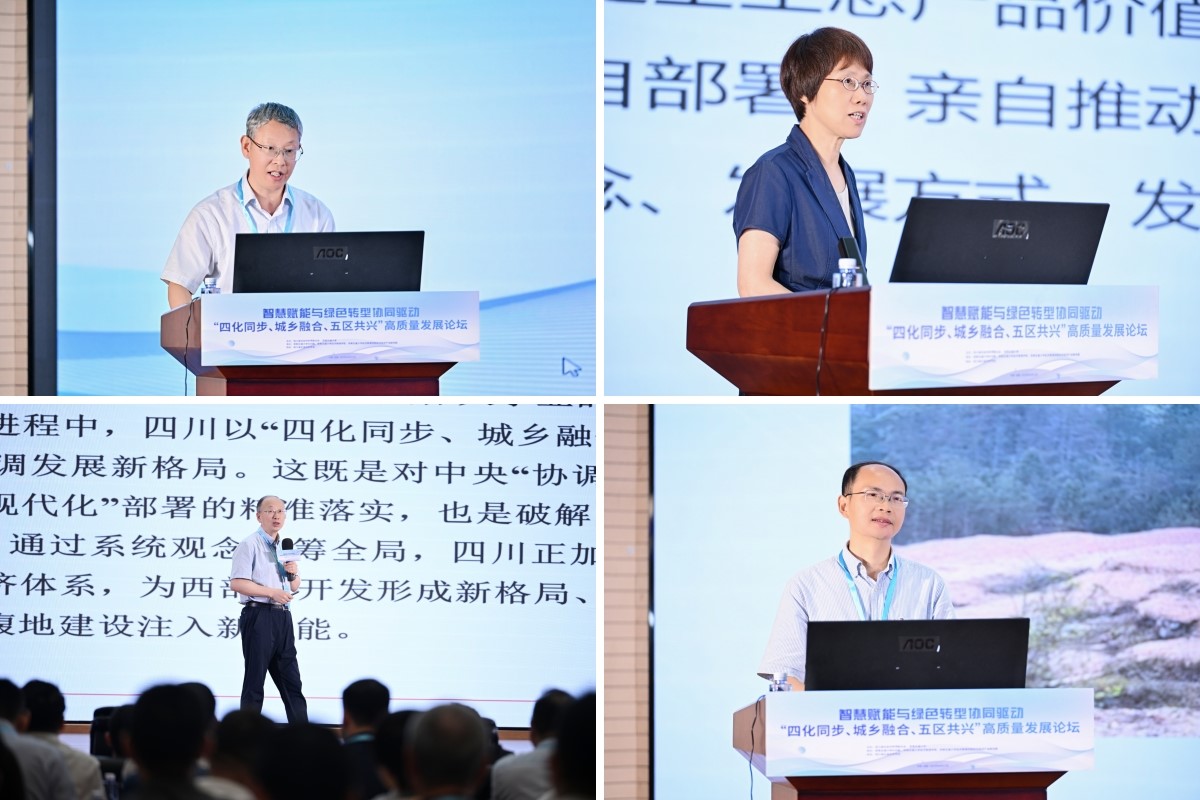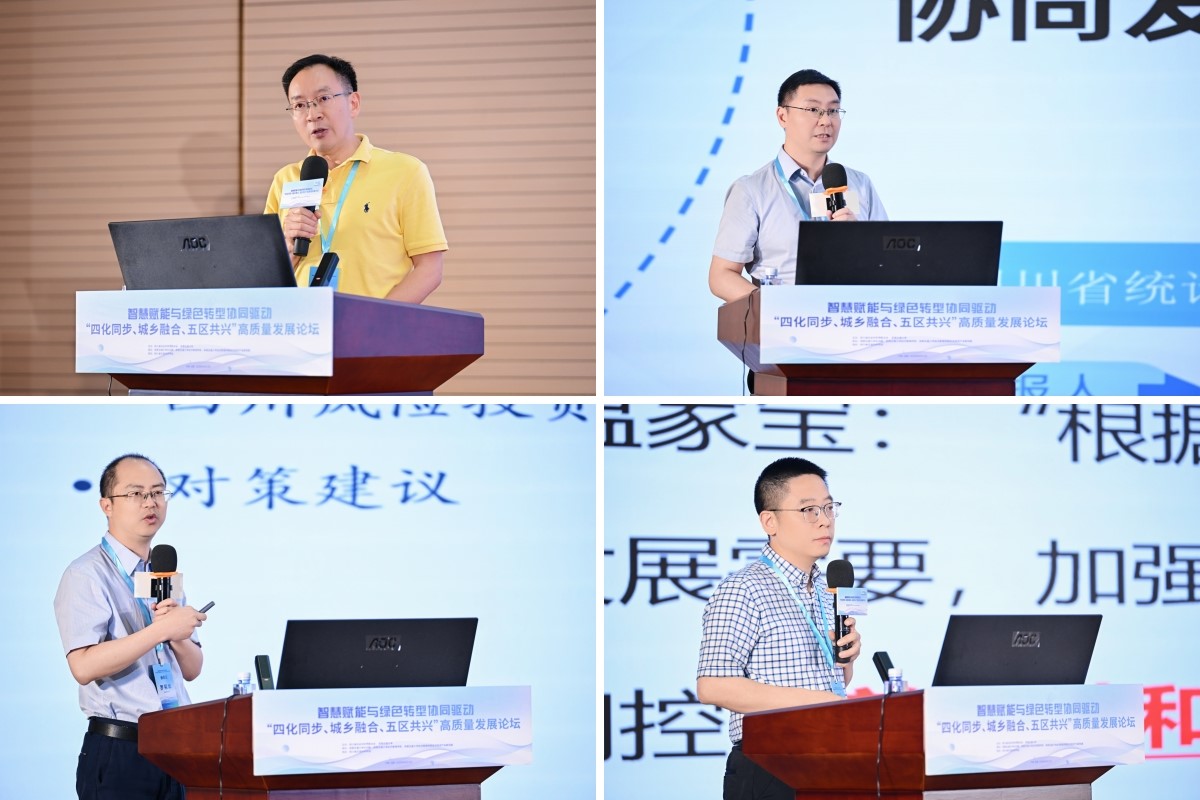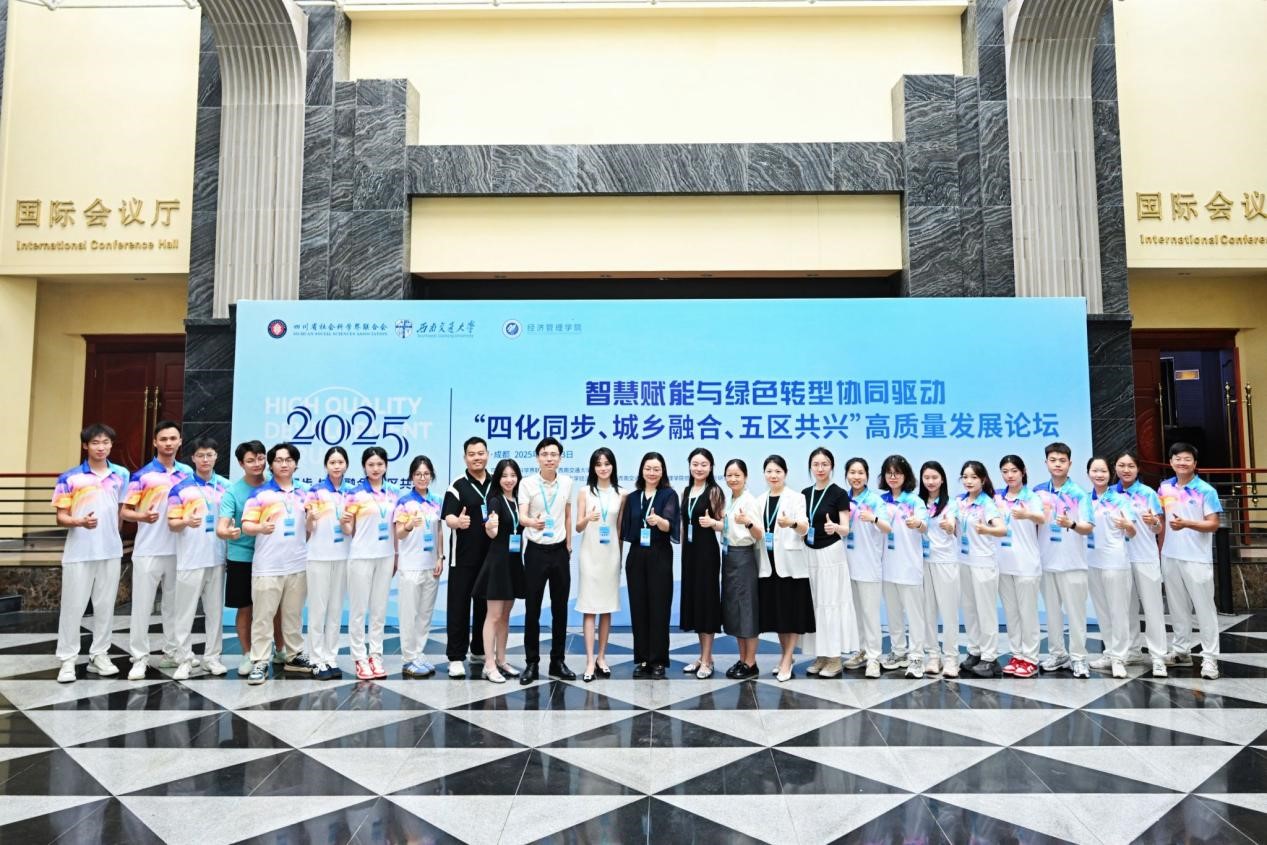June 13, 2025 | Chengdu—Southwest Jiaotong University (SWJTU) successfully convened the High-Quality Development Forum on "Synchronized Four Modernizations, Urban-Rural Integration, and Coordinated Development of Five Zones" at International Conference Hall on Jiuli Campus. Jointly hosted by the Sichuan Social Science Association and SWJTU, and organized by SWJTU's Division for Department of Liberal Arts and School of Economics and Management (SEM), the forum brought together around 100 experts and policymakers from government, academia, research institutions, and industry associations, such as the National Development and Reform Commission's Energy Research Institute, Policy Research Office of Sichuan Provincial Committee of the CPC, Party School of Sichuan Provincial Committee of the CPC, Sichuan Provincial Department of Economy and Information, Sichuan Provincial Department of Agriculture and Rural Affairs, and Sichuan Academy of Social Sciences, etc..
Themed "Synergistic Drive of Smart Empowerment and Green Transformation" , and chaired by Professor Gao Pingping, Deputy Secretary of the CPC SWJTU Committee, the event served as a critical platform for interdisciplinary dialogue on sustainable regional development strategies.


In her opening address, Ms. Qu Xiaohua, Secretary of Sichuan Social Science Association, emphasized the association’s commitment to implementing the guiding principles of the 20th CPC National Congress and advancing provincial development strategies. Through the successful hosting of its first three iterations, the forum has become a key platform for gathering insights to advance modernization. Highlighting growing pressures from resource constraints, environmental challenges, and imbalanced regional development, Qu emphasized Sichuan’s urgent needs of strategic solutions. She described the deep synergy between "Smart Empowerment" and "Green Transformation" represents a strategic imperative for Sichuan’s long-term competitiveness. She called on the social science community to closely follow the Sichuan Provincial Committee's development strategy, fully leverage its role as a think tank and advisory body, and accelerate the application of research outcomes to inform policy focusing on four key areas: “Deepening targeted research on pressing practical issues”; “strengthening cross-disciplinary collaboration to foster integrated support”; “accelerating the application of research outcomes to address practical needs”; and “solidifying collaborative networks to amplify the platform’s impact”, which will contribute to the advancement of the “Synchronized Four Modernizations, Urban-Rural Integration, and Coordinated Development of Five Zones” strategy.


Mr. Yu Minming, Secretary of the CPC SWJTU Committee, affirmed the university’s commitment to serving regional development through academic excellence and think tank initiatives. He noted that the university has consistently contributed policy recommendations, social services, and intellectual leadership in support of Sichuan’s modernization agenda. Hosting this forum, he said, reflects SWJTU’s dedication to fostering theoretical innovation and practical solutions for advancing the “Synchronized Four Modernizations, Urban-Rural Integration, and Coordinated Development of Five Zones” strategic initiative.

Three plenary keynote sessions on Green Transition, Systemic Governance, and Innovation followed, chaired by Professor Wang Yongjie of Xihua University.
Ms. Li Zhong, Deputy Director of Energy Research Institute of National Development and Reform Commission, presented “Thoughts on improving the mechanism for realizing the value of ecological products in the new era”. Her talk offered a comprehensive framework for monetizing ecosystem services, bridging theoretical models with practical policy design, offering new ideas for green development.
Dr. Li Houqiang, Deputy Director of Decision-Making and Advisory Committee of Sichuan Provincial Committee and Sichuan Provincial Government, delivered a presentation on “Adhering to a systematic perspective to promote high-quality development in Sichuan”. Li advocated for a holistic approach to balancing urban-rural dynamics, regional disparities, and socio-economic progress, outlining a holistic vision for Sichuan's high-quality growth.
Professor Huang Tao, Secretary of the CPC Sichuan University of Arts and Science Committee, introduced the emerging potential of the low-altitude economy in agricultural modernization. His presentation, “The theoretical framework and eastern Sichuan practice of low-altitude economy empowering agricultural modernization in hilly and mountainous areas”, showcased innovative drone and aerial logistics applications transforming rural productivity in the eastern Sichuan region.

Later in the morning, Professor Han Ke, Dean of SEM, presided over a second round of keynote presentations focused on Regional Integration and Innovation:

Professor Gao Zeng'an from SEM gave a presentation on the theme of “A profound understanding of President Xi Jinping’s important discourse on urban-rural integrated development”, providing a theoretical interpretation of President Xi Jinping’s discourse on urban-rural integrated development.
Dr. Zhou Zuo'ang, Director of Sichuan Provincial Institute of Statistical Science, presented findings from the “Research report on the coordinated development of Chengdu metropolitan area and Chongqing metropolitan area”, analyzing data trends and structural challenges in the Chengdu-Chongqing Twin-City Economic Circle.
Professor Luo Ronghua, Dean of School of Finance at Southwestern University of Finance and Economics, spoke on “Venture capital boosting innovation-driven development”, explaining how venture capital drives innovation-led growth, injecting momentum into regional innovation and development.
Professor Ran Rong, Deputy Director of Institute Sustainable Development Center at Chongqing University, shared insights on “Some thoughts on the development of think tanks in the twin-city economic circle”, providing decision-making and advisory suggestions for the enhancement of think tank capacity within the twin-city region.
In the afternoon, Professor Ma Feng, Associate Dean of SEM, chaired the Youth Scholars Forum on High-Quality Economic Development in the Sichuan-Chongqing Region. Early-career researchers from Sichuan University, SWJTU, Sichuan Agricultural University, and China West Normal University presented 23 papers across four parallel sessions, addressing themes including “the impact of financial development on import and export trade”, “the synergistic digital and green transformation in enterprises”, “the livelihood transition challenges for relocated farming households in Sichuan”, and “the development of regional sub-financial centers”.

Through multi-dimensional academic exchange and policy-oriented discussion, the forum aimed to provide robust theoretical support and practical guidance for advancing regional coordination and inclusive modernization. SEM reaffirmed its commitment to hosting high-level forums that respond to frontier issues in regional development and major national strategies. By strengthening collaboration among government, industry, academia, and research institutions, SEM seeks to continue contributing intellectual capital to the high-quality development of Sichuan and the broader Chengdu-Chongqing economic zone.

